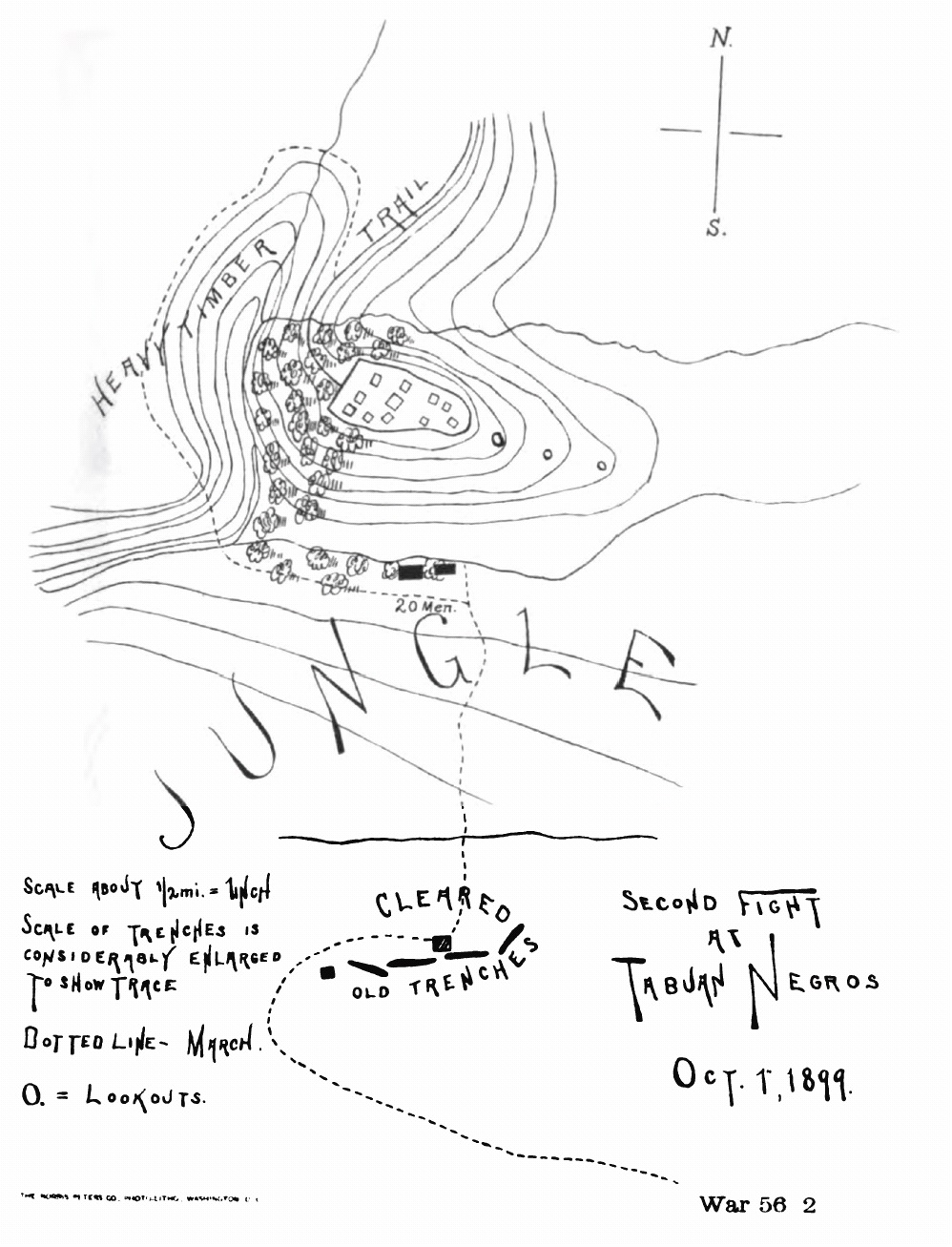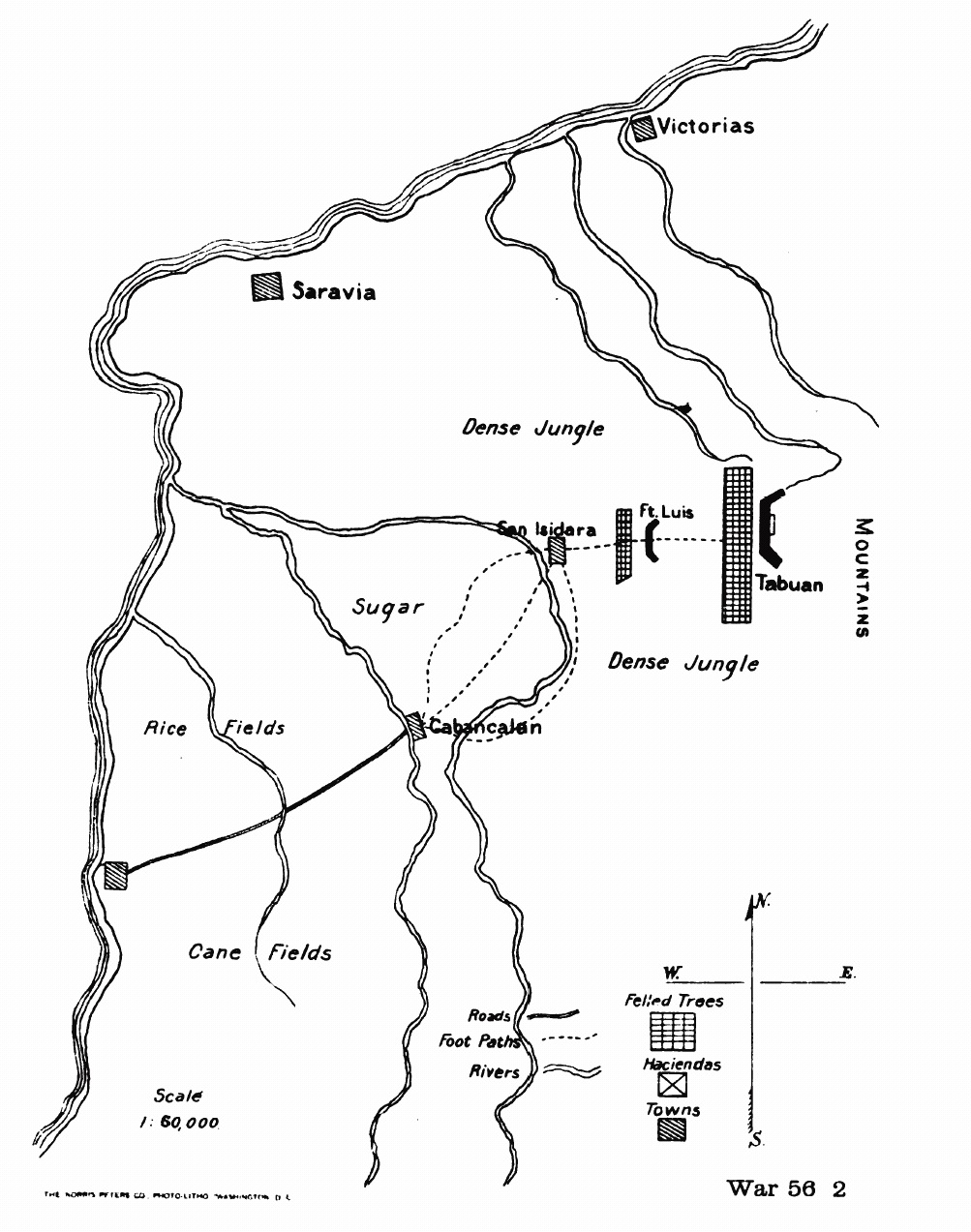BACOLOD, P. I., October 4, 1899.
The ADJUTANT SIXTH INFANTRY.
SIR: I have the honor to submit the following report of operations culminating in the second defeat of the so-called army of liberators of Negros near Tabuan, October 1, 1899.
I left Bacolod by proa September 29, and started out that night from Silay with about 20 men, at 9 o'clock. After a hard night's march in the mud and rain we reached the Hacienda Montelibano, near San Isidro, at 5 a. m. September 30. During that day my detachments were assembled, and consisted of 4 officers and 100 men, with 3 native police. The officers were Capt. Paul Shillock, assistant surgeon; First Lieut. Haydon Y. Grubbs, Sixth Infantry; Second Lieut H. A. Hanigan, Sixth Infantry, and myself.
Leaving 6 men and 3 native police at the hacienda as a guard for the rations, the command started at midnight on the 30th for the camp of the insurgents at Tabuan. The Malugo River, which was but a few hundred yards away, was running like a mill race, and was fully 4 feet deep. But for a long rope that we had taken along a crossing could not have been effected without loss of life, as the men were taken off their feet by the current. By 3 a. m. all had crossed, and the march was resumed and kept up without any delay until about 10 a, m., when we found ourselves at the foot of a slope leading up to the position of the enemy and about three-quarters of a mile away.
The slope was nowhere less than 20 degrees, and the ground, which was open, was strewn With fallen timber of great size; this, while making good shelter at times, would retard progress too effectively, and an attack on the front of a position like that did not afford the chances of success that I desired. Our guide said that there was no trail leading around to the left so that we could attack from the rear, but I concluded to make one. I left 20 men at the foot of the slope to cut off the retreat of the enemy in that direction and with the remainder of the force started around and up the mountain.
After climbing and clearing away a trail for nearly two hours we crossed a trail that led from the east ( probably from over the mountains) to the rear of the position, and followed it up without being seen until we were within 100 yards of the inclosure. A careful reconnoissance revealed that we were not discovered nor expected, and the attention of the enemy had been attracted by firing from the party which I had left behind and which had been discovered by a small party of the enemy.
I caused a deployment to be made at once, but while it was in progress and before I had two squads deployed we were discovered. Some of the enemy ran at once toward our left, and it was while trying to extend our left and to cut off the retreat of these fugitives that Lieutenant Grubbs was killed. We made the usual reply to their fire, with good results, for about fifteen or twenty minutes and then charged the trenches. Our men climbed over thorn and completed their work.
Our loss, besides Lieutenant Grubbs, mentioned above, was — wounded:
Capt. Paul Shillock, assistant surgeon; leg, slight.
Sergt. George Stevens, Company A, Sixth infantry; left arm, painful, necessitating amputation of the forefinger.
Private Harry Campbell, Company B, Sixth Infantry; leg, painful.
Private Elmer Affidalt, Company A, Sixth Infantry; leg, slight.
The enemy's loss was 20 dead on the field and in the trenches, and 1 captured. Many must have been wounded. Their force, as given to me by one of their own officers, who was mortally wounded, was about 150, of whom 60 had rifles.
We captured 12 rifles, including 1 Mauser and 1 Winchester, and 1 revolver; 5,000 rounds of Mauser and 1,000 rounds of Remington ammunition, a little powder, and quite an amount of lead for bullets; their reloading outfit, many bolos, spears, etc.; 10 sacks of rice, considerable quantities of clothing, hospital supplies, and a good many papers of more or less value from a secret-service point of view. The surprise was complete, and there was very little of value carried away by the insurgents.
Everything that we could not easily carry away I caused to be destroyed, and all the houses burned. I handed out the clips of Mauser ammunition, three or four to each man to carry in his pocket, and the rest to native bearers, and scattered it in the Malugo River, some 7 miles from the scene of action.
It is believed that those who escaped have gone hack to the haciendas, and that no concerted movement will be possible, even if they have stomach for it, for some weeks at least. The trenches we could not destroy, but there are no provisions, no clothing, no water, and no shelter for them there. The approaches are so difficult that supplies can be brought in only with great trouble and in small quantities.
The trenches and other defenses are the best I have seen or known of in this country. The shelters were about 6 feet high and 4 or 5 feet thick, packed with earth and revetted with green timber. The trenches admitted of a man passing nearly the length of the whole inclosure without being exposed to fire. The shelters were loopholed, and the ditch in front had fraises of split bamboo sharp as needles.
At 3 p. m., having interred the body of Lieutenant Grubbs, we started back, carrying our wounded on improvised litters. The rain and mud were such, however, that by 7 o'clock we had made but 2 miles, and darkness coming on rapidly and there being no possible chance of getting out of the jungle for hours, the command went into bivouac in the mud. At daylight we returned to the hacienda, fording the Malugo much easier than before, and also bringing over our wounded. The next day the command marched back to Silay.
The distance marched is, of course, estimated, most of the marches having been made at night, but was not less than 40 miles. The trails were still in fearful condition after the recent rains, and from midnight of September 30 to noon of October 2, there was not a man that did not have his feet and legs saturated with mud and ooze. Some of the rations were lost in fording the Malugo, and there was no breakfast on the 2d. But all privations were more than cheerfully met with by the men, and not one man fell out from the column.
The death of Lieutenant Grubbs cast a gloom on the party, for all the men had had a chance to observe him and to see the pains he was taking for their safety and comfort. He marched at the point of the advance all the time, and with a machete that he carried assisted greatly in clearing away the thick jungle so that our detour could be made. In action he was cool and brave, and his death has cut short a most useful career.
Captain Shillock was up on the firing line, with his assistant, Private Sallee, of the Hospital Corps, both helping the wounded without regard for their own safety.
Lieutenant Hanigan's energy, good judgment, and coolness under fire were very noticeable, and his assistance in forming the firing line while under fire and in keeping men coming from the rear from firing before they reached the line, aided materially in preventing confusion. I consider him worthy of a brevet for gallantry and coolness in action, and I so recommend.
Among the men whom I particularly noticed were First Sergeant Brady, Company M, Sixth Infantry, whose record as a brave and gallant soldier is second to none (this record is still untarnished), and Sergt. Alfred Roeder, Company K, Sixth Infantry, who has probabty been mentioned more frequently in communications regarding movements in this vicinity than any other person. He again demonstrated his worth as a soldier and as a man of most excellentjudgment. His knowledge of the country has made him invaluable to officers and others in charge of expeditions, and his coolness under fire excited my admiration. He has been recommended for a commission in the regular service by Lieutenant (now Major) Cole, Sixth Infantry, and for a commission in the volunteers by the regimental commander. Such advancement and recognition could not fall to a more deserving man, and I recommend him for the most favorable consideration. These remarks are no reflection on the other 91 men, than whom there can be no better soldiers in the service.
Very respectfully,
B. A. POORE,
Captain, and Adjutant Sixth Infantry, Commanding


